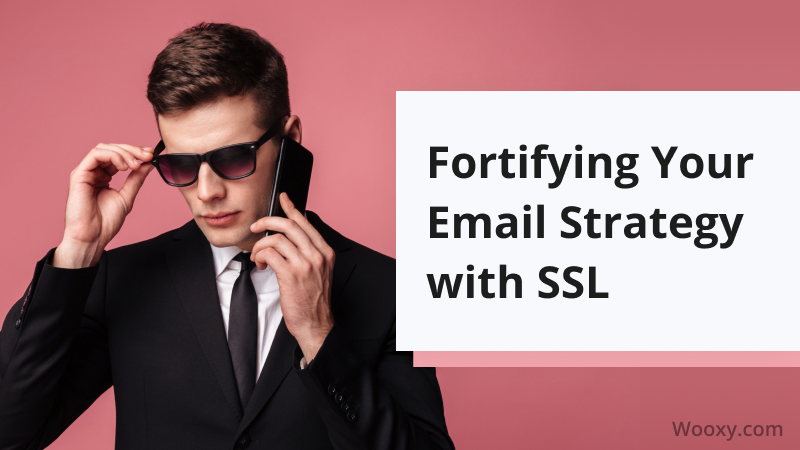From HTTP to HTTPS: Securing Your Email Communications with SSL
In today’s digital landscape, cybersecurity is paramount. With cyber threats evolving constantly, businesses must prioritize the security of their online communications. In 2024, using HTTPS for email marketing is no longer just an option; it’s essential.
Using HTTPS in emails and newsletters ensures that the data transmitted between the sender and the recipient remains confidential and cannot be intercepted or tampered with by malicious actors.
Transitioning from HTTP to HTTPS, fortified by SSL (Secure Sockets Layer), is the key to safeguarding your email communications and protecting sensitive information such as personal details or financial transactions. So, let’s discover this topic!
Understanding HTTPS and SSL
Let’s start with the basics. HTTPS, or Hypertext Transfer Protocol Secure, is the secure version of HTTP, the protocol for sending data between your browser and the website you are connected to. HTTPS encrypts the data transmitted between the sender and the recipient, ensuring that malicious actors cannot intercept or tamper with it. This encryption is made possible by SSL, a protocol that establishes a secure connection between the user’s browser and the website’s server.
The Importance of HTTPS in Email Marketing
Why is HTTPS crucial for email marketing? Firstly, it ensures the confidentiality and integrity of your email communications. By encrypting the data exchanged between your email server and the recipient’s email client, HTTPS prevents unauthorized access and protects sensitive information, such as personal details and financial transactions, from being compromised.
Moreover, HTTPS enhances trust and credibility. In an era where cyber threats abound, customers are increasingly wary of sharing their information online. By displaying the padlock icon and “Secure” label in the browser’s address bar, HTTPS reassures users that your website is safe to interact with, instilling confidence and encouraging engagement.
The Risks of Using HTTP in Email Communications
What happens if you continue to use HTTP links in your email communications? Without the encryption provided by HTTPS, sensitive information transmitted through these links is susceptible to interception and exploitation by cybercriminals.
This risks your customers’ privacy and exposes your business to potential data breaches and regulatory penalties.
New Requirements from Google and Yahoo
As of February 1, 2024, leading email providers like Google and Yahoo have implemented new requirements mandating the use of HTTPS in email communications. Please comply with these requirements to avoid emails being flagged as insecure or blocked outright, severely impacting deliverability and engagement rates.
Other email providers and internet browsers are also cracking down on unsecured connections. Emails containing HTTP links may trigger security warnings or be flagged as suspicious, leading to lower deliverability rates and tarnished sender reputation.

How to Make the Transition to HTTPS
Transitioning from HTTP to HTTPS is a straightforward process that requires careful planning and execution. The first step is to obtain an SSL certificate from a trusted Certificate Authority (CA). This certificate authenticates your website’s identity and encrypts the data transmitted between your email server and the recipient’s email client.
Once you’ve obtained the SSL certificate, you’ll need to install it on your email server and configure your email marketing platform to use HTTPS for all communications. This may involve updating links in your email templates, ensuring compatibility with HTTPS protocols, and conducting thorough testing to verify the integrity of your setup.
SSL Certificate: What is it
Think of an SSL certificate as a digital security badge for your email communication. It verifies that you are who you say you are (domain validation) and encrypts the connection between your email server and the recipient’s inbox. This encryption scrambles the information, making it unreadable to anyone trying to intercept it, protecting sensitive data like email addresses and click-through links.
Why Are SSL Certificates Important for Email Marketing?
The benefits of using SSL certificates in email marketing are multifaceted:
- Security: As mentioned above, encryption safeguards recipient information, crucial for building trust and avoiding security breaches.
- Deliverability: Major email providers like Gmail and Outlook prioritize emails with HTTPS links, improving your chances of landing in the inbox instead of the spam folder.
- Reputation: Websites and emails with HTTP are increasingly flagged as insecure, potentially deterring subscribers and damaging your brand image. Switching to HTTPS demonstrates your commitment to data security and fosters trust.
- Compliance: Certain industries have regulations mandating secure communication, and HTTPS helps you adhere to these legal requirements.
How to Get an SSL Certificate for Email Marketing:
- Choose a certificate authority (CA): Popular options include Let’s Encrypt, DigiCert, and GlobalSign.
- Select the correct type of certificate: For domain validation (DV), proving ownership of your domain suffices. Additional verification steps confirm your identity for organization validation (OV) or extended validation (EV).
- Generate a Certificate Signing Request (CSR): This request contains information about your domain and server. Follow your email marketing platform’s instructions for generating a CSR.
- Install the certificate: After purchasing or obtaining a free certificate, follow your platform’s specific instructions for installation. Usually, you’ll upload the certificate and private key provided by the CA.
By following these steps, you can ensure your email marketing is secure, trustworthy, and compliant with current standards in 2024 and beyond.
Obtaining an SSL Certificate: Simplified with Wooxy
You might be wondering if obtaining an SSL certificate is a complicated process. While it can seem daunting, especially for those unfamiliar with web security protocols, Wooxy offers a straightforward solution.
For clients who find obtaining an SSL certificate challenging or time-consuming, Wooxy provides a convenient option. Through our platform, clients can opt for a service to purchase and set up an SSL certificate hassle-free. Our team of experts will guide you through the process, ensuring your email communications are secured with HTTPS encryption without any unnecessary complications.
By leveraging Wooxy’s service for SSL certificates, clients can streamline their transition to HTTPS and focus on what truly matters: delivering impactful email campaigns and nurturing customer relationships. With our support, you can rest assured that your email communications are fortified against cyber threats, giving you and your customers peace of mind.
Conclusions
In conclusion, transitioning from HTTP to HTTPS is essential for securing email communications and protecting your business and customers from cyber threats. By encrypting the data exchanged between your email server and the recipient’s email client, HTTPS enhances privacy, trust, and credibility, laying the foundation for successful email marketing campaigns. With the support of SSL and innovative platforms like Wooxy, you can fortify your email strategy and embark on a journey toward safer and more effective communication channels.




